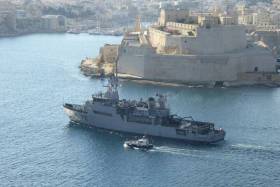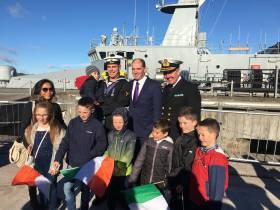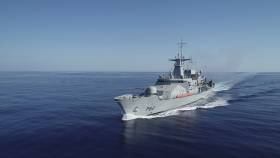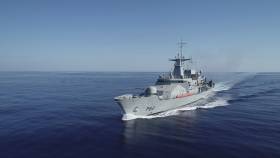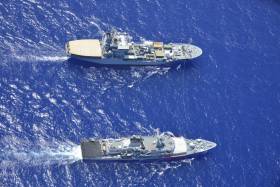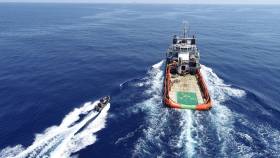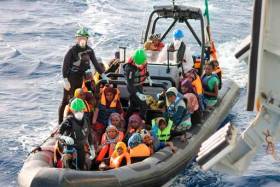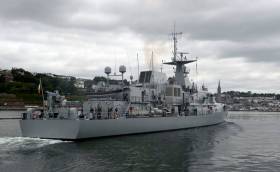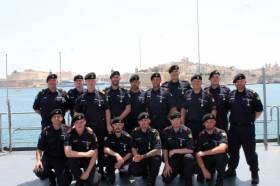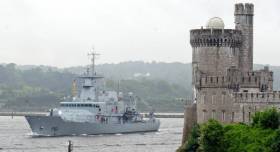Displaying items by tag: Operation Sophia
#navy - The deployment of patrol vessels by the Naval Service is to end in the EU's big migrant rescue operation in the Mediterranean.
The move writes Independent.ie follows a decision by the EU to stop maritime patrols of the sea between north Africa and Europe and to focus, instead, on air patrols and closer co-ordination and co-operation with Libyan authorities.
Naval vessel, LE Eithne, with a crew of about 60, was due to return to the Mediterranean at the end of the month.
But the patrol vessel will now remain at home after previously being involved in the rescue of more than 500 migrants from the Mediterranean.
The mandate for the operation, codenamed Sophia, was due to expire on Sunday but will now be extended for a further six months with a similar aim of disrupting people smuggling and trafficking in the Med.
More on the story can be read here.
LÉ James Joyce Completes 100 Day Operation Sophia Role Returns to Big Welcome Home
#NavalService - LÉ James Joyce completed a 100 day tour of duty in the Mediterranean Sea as part of EUNAVFOR-Med, Operation Sophia, having returned yesterday to its homeport of Cork Harbour to be welcomed by families and loved ones alongside the quay.
Also in attendence at the Irish Naval Service Base on Haulbowline Island, was Minister with Responsibility for Defence, Mr. Paul Kehoe T.D and by the Chief of Staff of the Defence Forces, Vice Admiral Mark Mellett DSM.
The Offshore Patrol Vessel (OPV) P60 class, Commanded by Lieutenant Commander Martin Brett, and a crew comprising of 57 members of the Defence Forces received a warm welcome from family, friends and colleagues at the base's Oil Wharf facing Cobh.
LÉ James Joyce became the third Naval Service ship deployed to the Mediterranean as part of Operation Sophia when the OPV departed in early July.
The ship's mission also included in conducted the hailing of more than 200 merchant ships, 6 friendly approach visits as previously covered on Afloat and 2 inspections.
The activities were all in support of the UN Arms Embargo off the coast of Libya, Africa as part of the EU’s comprehensive approach to disrupt trafficker/smuggler networks within the Mediterranean.
In advance of the homecoming of the OPV, Afloat.ie adds berthed at Cobh was newbuild sister LÉ George Bernard Shaw along with LÉ William Butler Yates.
Tánaiste Rules Out Naval Service Suspending Mediterranean Role
#NavalService - The Tánaiste Simon Coveney has ruled out suspending Ireland's Naval Service involvement in the Mediterranean migrant rescue mission and bringing crews home to deal with staff shortages.
As The Irish Times writes, Independents4Change TD Clare Daly claimed “the service is in meltdown”, said that for the first time in its history the service was unable to do its core function of sea fisheries protection.
She suggested it was time suspend the State’s participation in Operation Sophia and bring staff home to “protect our sea fisheries and coastal waters”.
She was commenting after it emerged that senior Naval personnel were ordered to end the 72 hours notice personnel normally got to provide short-term relief on ships and that personnel would have to be ready for duty without warning.
The order was subsequently rescinded.
The Dublin Fingal TD said that ships normally crewed by 44 personnel were putting to sea with 34 and she asked if it was time to bring the crew members home from Operation Sophia.
For further reading on Operation Sophia, click the link to the newspaper here.
Naval Service: Department of Defence Denies Involvement in NATO Exercise
#NavalService - The Irish Times writes the Department of Defence denied that a Naval Service patrol ship was involved in any NATO (North Atlantic Treaty Organisation) exercise or operation during a manoeuvre with a Spanish frigate in the Mediterranean earlier (last week).
An exercise between Naval Service patrol ship LÉ James Joyce and a Spanish frigate Cristobal Colon prompted a tweet from the Spanish defence ministry with hashtag “We are NATO” last Monday.
The Department of Defence said the Cristobal Colon was providing support to “Operation Sophia”, the EU naval force mission in the Mediterranean, when it spent time with the LÉ James Joyce.
It confirmed that the Spanish frigate was transiting the Central Mediterranean en route to join up with the Nato-led “Operation Sea Guardian”.
For more on this story, the newspaper has a report here.
#NavalService - Previously on Afloat, the Irish Naval Service P60 class LÉ James Joyce was featured conducting 'Friendly Approaches', this time the OPV is seen pictured above undergoing a replenishment at sea (RAS) exercise.
The Offshore Patrol Vessel, LÉ James Joyce was deployed last month to join Operation Sophia/EUNAVFOR (European Union Naval Force). The EU led mission is to combat and disrupt people-trafficking in the central Mediterranean Sea off north Africa.
Due to the large distances at sea during Operation Sophia, naval vessels from other participating EU member states also involve RAS. The above exercise involved the auxiliary tanker that Afloat.ie has identified as the German Navy's FGS Mosel. The 1993 built vessel is the second of a quartet of Type 404 'Elbe' class tanker tenders.
Auxiliary tankers such as 3,586 displacement FGS Mosel carry out bunkers, a nautical term to supply fuel to ships. In addition the tender is designed to provide fresh water, ammunication and general supplies that can be stored in containers as seen above on the deck.
Irish Naval Service Conduct 'Friendly Approaches' In Mediterranean Sea As Part of Operation Sophia
#NavalService - As previously reported on Afloat, LÉ James Joyce last month was deployed to the central Mediterranean to take over Operation Sophia duties which also involve 'friendly approaches'
The Irish Naval Service P60 class Offshore Patrol Vessel (OPV) replaced a sister, LÉ Samuel Beckett which had worked alongside other EU member states navies participating in the migrant mission. Ireland first became involved in Operation Sophia last year.
The core tasks of Operation Sophia / EUNAVFOR -Med is designed to combat and disrupt people-smuggling in addition to saving lives in seas off Libya, north Africa. In addition the role of friendly approaches is included. According to the Naval Service they provide an opportunity of interact face-to-face with members of the merchant vessels’ community who regularly transit in the area of naval operations.
Friendly approaches enable in providing messages on the operation and to collect useful information on what is happening at sea.
Prior to a friendly approach is conducted, the opportunity is at first given as an invitation of the Master of the vessel. In addition the vessels do not form any part of boarder control or inspection process.
The overall level of awareness arising from friendly approaches provides Operation Sophia to be more effective having assessed such operational activity and interacting with merchant ships in a personal manner.
Since the UN arms embargo off the Libyan coast began in 2016, Operation Sophia assets have carried out 117 friendly approaches.
#NavalService - Naval Service crew from offshore patrol vessel (OPV) LÉ Samuel Beckett arrived home to a heroes welcome today after three months in the Mediterranean on humanitarian rescue operations.
The vessel writes Independent.ie is under the command of Lt Cmdr Eoin Smyth, was cheered to the echo as it rounded Roche's Point in Cork harbour and berthed at Haulbowline Naval base.
Lining the quayside were the families of the 54 crew members - including dozens of children who had missed their enlisted parents since the deployment last May.
LÉ Samuel Beckett was the second Irish patrol ship to deploy to the Mediterranean this year as part of Ireland's commitment to Operation Sofia, the European mission to help migrants attempting to cross from north Africa to the EU.
The OPV has been replaced on station as Afloat previously reported in the Mediterranean by LÉ James Joyce.
For further reading on the return of LÉ Samuel Beckett, click here.
#NavalService- LÉ James Joyce is currently in the Mediterranean having departed Cork Harbour almost a week ago to replace the first Irish Naval Service ship to be deployed to Operation Sophia during this year, writes Jehan Ashmore.
Prior to the departure last Friday, Chief of Staff of the Defence Forces Vice Admiral Mark Mellett DSM, bid farewell to the crew LÉ James Joyce. The Offshore Patrol Vessel was berthed at the oil wharf at Haulbowline Naval Base in preparation for the overseas deployment.
In recent days, LÉ James Joyce was offshore of Algeria and today is heading further eastward towards the cental Mediterranean. The second of the OPV90 class offshsore patrol vessels will takeover duties from LÉ Samuel Beckett which in March began deployment for Operation Sophia.
Last year the OPV80 class LÉ Niamh was deployed as the first Irish Naval Service ship in Operation Sophia, an EU led mission designed to disrupt people-trafficking in Libya in addition to saving the lives of migrants.
LÉ James Joyce is under the Command of Lieutenant Commander Martin Brett. A total of 57 personnel make up the crew from members of the Defence Forces. They will be on extended deployment since receiving notice that they would be sailing to assist Operation Sophia which involves other navies from participating EU member states.
#Navy - Crew members of L.É. Samuel Beckett in Malta last weekend were presented with their Operation Sophia medals from the Irish Naval Service, writes Jehan Ashmore.
Flag Officer Commanding Naval Service (FOCNS) Commodore Michael Malone visited Valletta Harbour last weekend to present the medals to the crew who since April have been deployed in the Mediterranean.
Since the fallout from Libya's boat people trafficking in 2015, the EU launched as a military operation the European Union Naval Force Mediterranean (EUNAVFOR Med) also known as Operation Sophia. The name of the operation was inspired from Sophia, a baby born on board a German Navy frigate whose mother, a Somali refugee was rescued initially by the UK'S Royal Navy.
The 2014 commissioned OPV90 leadship L.É. Samuel Beckett is the second Irish Naval Service patrol ship to take part in Operation Sophia which began last October. On that occasion, OPV80 'Roisin' class LÉ Niamh made history as this was the first time that Ireland joined the EU naval operation tasked against smugglers and traffickers.
Unlike previous other humanitarian missions focusing on Search And Rescue (SAR) of refugees, Operation Sophia among its remit addresses some of the root causes of human-trafficking and migration crisis.
The deployment of LÉ Niamh for Operation Sophia ended late last year. Taking over duties in April this year saw L.É. Samuel Beckett join the EU naval fleet task force comprising of 10 participating member-states.
Following the FOCNS overseas visit to Malta, Commodore Michael Malone conducted another ceremony held in the Naval Base on Haulbowline Island, lower Cork Harbour. This involved an annual inspection of L.É. James Joyce. The second OPV90 class commissioned into service in September 2015 was followed by L.É. William Butler Yeats in October 2016.
OPV LÉ Samuel Beckett Departs On Mission to Counter Human-Trafficking in Mediterranean
#Navy - Leadship of the Irish Naval Service OPV90 class, LÉ Samuel Beckett is departing today for the Mediterranean to take part in 'Operation Sophia'.
As The Irish Examiner reports, Ireland first joined the EU naval operation against smugglers and traffickers last October when another Offshore Patrol Vessel, the OPV80 class LÉ Niamh was deployed for a three-month mission.
Minister with Responsibility for Defence Paul Kehoe says the crew will be helping to address some of the root causes of migration and human trafficking.
For more click this link.


























